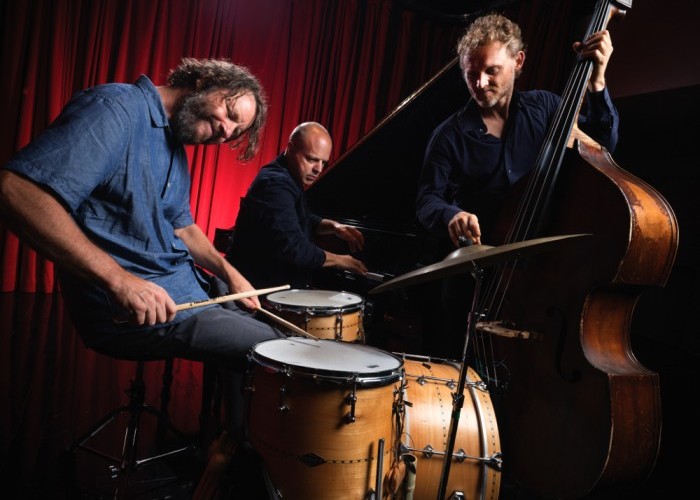Jan 13, 2026 2:09 PM
More Trump-Kennedy Center Cancellations
The fallout from the renaming of the John F. Kennedy Center for the Performing Arts to include President Donald…

Drummer Billy Martin (left), keyboardist John Medeski and bassist Chris Wood all have recording projects outside of their trio.
(Photo: Jimmy & Dena Katz)Medeski Martin & Wood’s new album offers a summation of the group’s purpose three decades into its unconventional career.
Omnisphere (Indirecto), recorded in 2015 with new-music ensemble Alarm Will Sound, provides evidence of the trio’s boundless creativity.
In the late 1990s, members of MMW were road warriors allied to progressive ideals with modest means, traversing the country, living gig-to-gig in a camper van. As the youngest in the band, it was bassist Chris Wood’s daily task to scout out a picnic table on which to clamp a corn grinder to help prepare MMW’s healthy breakfasts. But during the era when the trio was playing 200 high-profile shows a year, MMW occasionally shared bills with jaded rock acts that seemed to be phoning it in.
All three vowed they’d never succumb to that ennui.
Wood, keyboardist John Medeski and drummer/percussionist Billy Martin each had other projects beckoning as the trio transitioned out of those do-it-yourself days, their extra-curricular activities seeping in after a run of Blue Note albums the ended in the early 2000s. But whenever the band has reconvened, the members have clicked. It’s as though they were back in Hawaii, jamming in a shack out in the jungle together, a setting that spawned 1996’s Shack-man (Gramavision). The image of renegade hippies who gave up New York City apartments to live on the road—concocting spontaneous grooves for a fervent fanbase—is far from the whole story of these three musicians. Each is a deep thinker with voracious and distinct musical tastes.
Omnisphere is the full realization of a longtime goal for MMW to collaborate with a classical ensemble. The opportunity to record with Alarm Will Sound—a Brooklyn-based, 18-piece band conducted by Alan Pierson and known for innovative work with artists like Steve Reich and Björk—came about in 2015 with financial backing from Michael Watt, co-owner of Ronnie Scott’s, the hallowed London jazz club.
Watt, a Runyonesque character with a kaleidoscopic life story, took Medeski Martin & Wood to dinner during its residency at his venue, and Martin floated the idea of a live recording with Pierson’s troupe.
“Perhaps he’d heard I was kinda crackers, as I’d recently sunk a lot of money into [composer/arranger] Vince Mendoza’s Epiphany project [with the London Symphony Orchestra],” Watt said, discussing his role as executive producer on Omnisphere.
The New Zealander, who claims to have resided in 32 countries over the years, has helped several notable jazz clubs with spontaneous donations, and held a 25 percent stake in New York’s cutting edge Tonic before real estate pressures and skyrocketing rents forced closure of the Lower East Side experimental music room. That MMW issued multiple recordings captured during the late ’90s at the now-shuttered space might have cemented a bond.
“Owning a jazz club that’s very successful, I wanted to put something back in,” Watt said without fanfare.
Since he was kicked out of his posh high school in Christchurch for playing hooky at a Ted Heath Orchestra concert, the jazz-loving Watt made the bulk of his money selling a sports rights company, after drilling for oil in the Gulf of Mexico and building ski-lifts in Canada, among other entrepreneurial thrills and spills.
“[MMW] were fit for purpose. They cut the mustard as far as I was concerned, even though this idea they put to me was far from the mainstream,” Watt said. “I’d never heard of Alarm Will Sound, but they looked interesting, and the idea of these three adventurous dudes collaborating to make avant-garde musical art appealed to me.”
Conductor Pierson knew little about Watt’s involvement as the eminence grise behind MMW’s ambitions, but was accustomed to taking on challenges. The native Chicagoan accrued notoriety for revamping the profile of the once-ailing Brooklyn Philharmonic and concocting unique strategies for integrating orchestral music into the community. And Alarm Will Sound, which he founded with producer Gavin Chuck at the Eastman School of Music in 2001, rapidly built a reputation for brooking few boundaries. The group’s catalog includes a brilliant conflation of Reich’s time-phase concepts with the music of Radiohead, as well as an ambitious theatrical presentation of The Beatles’ sound collage “Revolution 9,” reimagined by the band’s late French horn player, Matt Marks (1980–2018).

Belá Fleck during an interview with Fredrika Whitfield on CNN.
Jan 13, 2026 2:09 PM
The fallout from the renaming of the John F. Kennedy Center for the Performing Arts to include President Donald…

Peplowski first came to prominence in legacy swing bands, including the final iteration of the Benny Goodman Orchestra, before beginning a solo career in the late 1980s.
Feb 3, 2026 12:10 AM
Ken Peplowski, a clarinetist and tenor saxophonist who straddled the worlds of traditional and modern jazz, died Feb. 2…

The success of Oregon’s first album, 1971’s Music Of Another Present Era, allowed Towner to establish a solo career.
Jan 19, 2026 5:02 PM
Ralph Towner, a guitarist and composer who blended multiple genres, including jazz — and throughout them all remained…

Rico’s Anti-Microbial Instrument Swab
Jan 19, 2026 2:48 PM
With this year’s NAMM Show right around the corner, we can look forward to plenty of new and innovative instruments…

Richie Beirach was particularly renowned for his approach to chromatic harmony, which he used to improvise reharmonizations of originals and standards.
Jan 27, 2026 11:19 AM
Richie Beirach, a pianist and composer who channeled a knowledge of modern classical music into his jazz practice,…